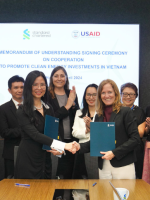
Under Vietnam’s green hydrogen development strategy to 2030 and vision towards 2050 approved by the Prime Minister last February, renewable power will include production, storage, transportation, domestic consumption and export.
Green hydrogen is considered the key to net zero emissions by 2050.
To pave the way for green hydrogen development in Vietnam, PtX Outreach has made recommendations to accelerate hydrogen-based synthetic material/fuel production technology in Vietnam.
PtX Outreach is organized by GIZ (German Corporation for International Cooperation GmbH) and funded by BMWK (the Federal Ministry for Economic Affairs and Climate Action)
With Vietnam’s specific conditions, green hydrogen is expected to mostly serve the fields of electricity production, transport and other industries (oil refinery, fertilizer manufacturing, metallurgy and cement production). Of these, oil and gas is one of the pioneering industries.
Dr Nguyen Huu Luong, a senior expert of the Vietnam Oil and Gas Institute, said the potential of green hydrogen in the oil and gas sector is great. Green hydrogen can be used to replace fossil fuels in many operations, such as energy transition for traditional LNG-fired power plants, oil refinery operation, chemical, fertilizer and electricity production. Also, it can provide energy to transport means.
It can be used as a reagent to convert CO2 emissions into sustainable aviation fuel (SAF).
The expert stressed that in order to effectively exploit the potential of green hydrogen in the oil and gas sector, Vietnam needs to apply strategies as follows:
First, promote the research, development and investment in technologies related to green hydrogen. Second, encourage the use of green hydrogen instead of fossil fuel. Third, encourage the development of a market for green products.
Nguyen Duc Minh, a senior advisor of PtX Outreach-GIZ, said green hydrogen and Power-to-X (PtX) technologies are developing rapidly. and Vietnam is taking the first steps to use the technologies but has no regulations yet.
Vietnam still doesn’t have infrastructure that can satisfy requirements for use. Moreover, green hydrogen production costs are still high compared with traditional fuels. These all pose great challenges to Vietnam when “entering the green path of the hydrogen economy”.
Thuy Nga




